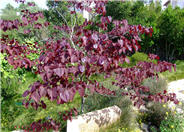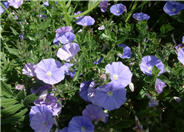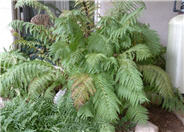
Common name:Forest Pansy Redbud
Botanical name:Cercis canadensis 'Forest Pansy'
This small tree may reach 25' tall and it has dark green/purple leaves that are purple in the fall. Amazing pink flowers bloom in the spring and fill the tree.

Common name:Dwarf Morning Glory
Botanical name:Convolvulus sabatius
Convolvulus sabaticus is a perennial that grows 1'-2' high, with branches that spread to 3' or more. It produces blue to lavender flowers with blooms of 1"-2" wide. The soft, evergreen leaves are 1/2" to 1.5" long.

Common name:Blackstem Pittosporum, Tawhiwhi
Botanical name:Pittosporum tenuifolium
This medium sized evergreen shrub has medium green leaves with black stems. Its pleasing texture and narrow, upright growth make this a fine hedge or screen. It is easy to grow in soils with good drainage. Many new cultivars are being introduced with smaller, variegated and/or multi-colored foliage.

Common name:Amethyst Mist Coral Bells
Botanical name:Heuchera 'Amethyst Mist'
This perennial will grow 1'-2' tall and has medium sized green leaves with pink flowers that bloom in spring and summer.

Common name:Giant Chain Fern
Botanical name:Woodwardia fimbriata
The Giant Chain Fern is a large fern that grows 4'-8' tall. It can tolerate full sun but does best in some shade. This fern is native to California and is drought tolerant.

Common name:Carmel Creeper
Botanical name:Ceanothus griseus horizontalis
Carmel Creeper is one of the most popular forms of spreading shrubs. Its glossy oval leaves of 2" are bright green. The tiny, light blue flowers are abundant and form 1" clusters. This shrub benefits from pruning. It does best in well-drained soil with little to no summer water.

Common name:White Birch, European White Birch
Botanical name:Betula pendula
This medium-size weeping tree will grow to about 40' tall and has a whitish/brown bark with deciduous green leaves. This is one tree that can be planted in a lawn area but is not recommended for drought tolerant designs.
| Designer: The Plant Nerd | Walkway View Retreat |
Photographer: GardenSoft |
Soils and Compost:
Incorporate compost 6" into your soil to retain water, reduce compaction, feed earthworms, and provide valuable nutrients to your plants.
Water Saving Tip:
Mulching around plants helps retain water and improves the soil.
Integrated Pest Management:
Attract, or buy beneficial insects such as ladybugs and lacewings to control pest outbreaks in your garden.
